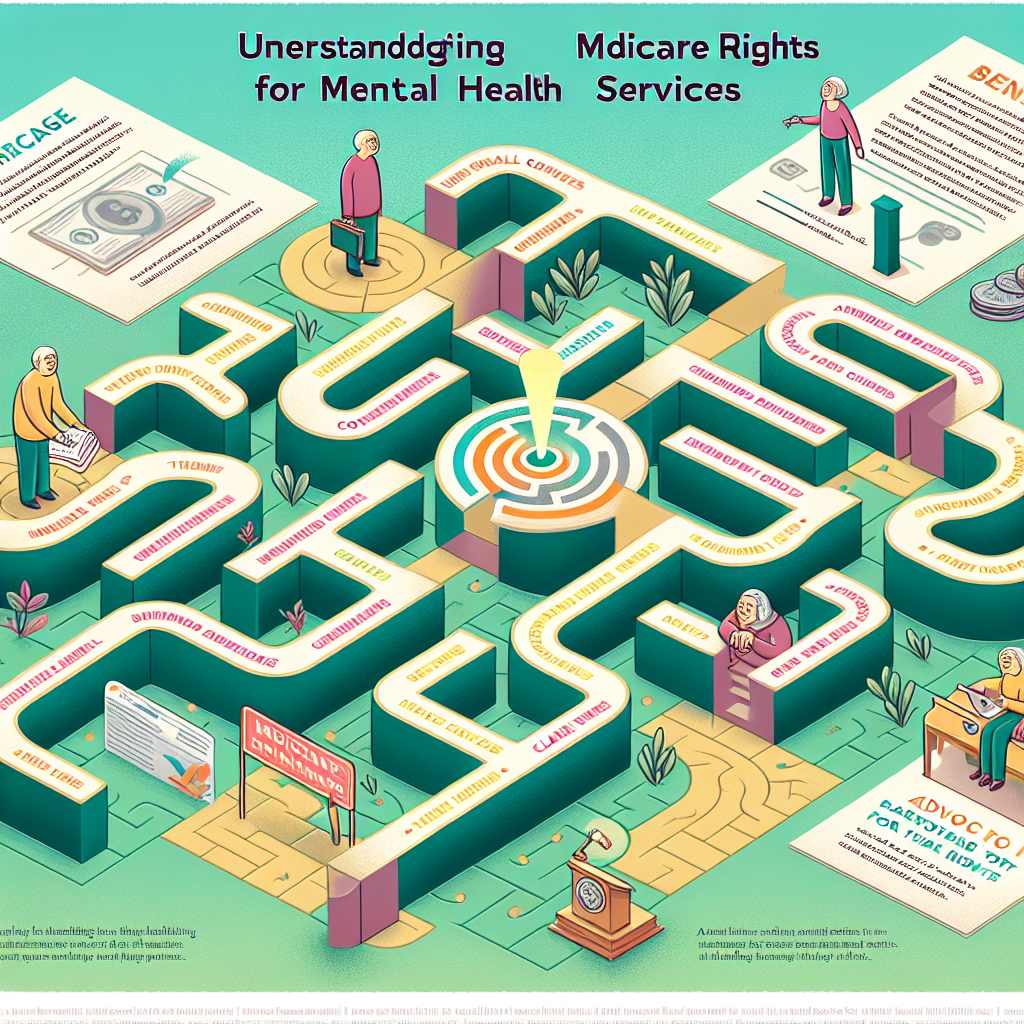Navigating the complex world of Medicare can be overwhelming, especially when it comes to understanding your rights for mental health services. With recent advancements in mental health awareness and treatment, it’s more important than ever to ensure you’re utilizing your coverage effectively. This guide will break down your Medicare rights for mental health services, helping you navigate the often confusing policies and procedures. From understanding your benefits to accessing the care you need, we’ll provide you with the information you need to advocate for yourself and make the most of your coverage. Let’s take charge of our mental health together.
Understanding Medicare Coverage for Mental Health Services
When it comes to mental health services, understanding what Medicare covers is crucial for beneficiaries. Here are key points to consider:
- Overview of mental health services covered by Medicare
- Medicare covers a wide range of mental health services, including therapy, counseling, and psychiatric evaluations.
- It also covers inpatient mental health care in a psychiatric hospital, as well as outpatient services such as visits to a psychiatrist or clinical psychologist.
- Eligibility criteria for accessing mental health services under Medicare
- To access mental health services under Medicare, beneficiaries must be enrolled in Medicare Part A or Part B.
- They must also meet specific criteria for the type of service they require, such as a referral from a primary care physician for certain treatments.
- Importance of knowing your rights for mental health care
- Understanding your rights as a Medicare beneficiary for mental health care empowers you to advocate for the services you need.
- Knowing what is covered and what is not can help you make informed decisions about your mental health treatment options.
Types of Mental Health Services Covered by Medicare

Understanding your rights and coverage under Medicare for mental health services is crucial for advocating for the care you need. Regularly reviewing your plan, utilizing preventive services, and being aware of appeal rights can help maximize your mental health coverage and ensure you receive the necessary services. Additionally, seeking assistance from resources such as the Medicare Rights Center and mental health advocacy organizations can provide valuable support and guidance in navigating your coverage.
Outpatient Services
- Counseling and Therapy Sessions: Medicare covers a wide range of outpatient counseling and therapy sessions for mental health services. These sessions typically involve one-on-one or group sessions with a licensed mental health professional, such as a psychologist, social worker, or counselor. The goal of counseling and therapy is to address mental health concerns, improve coping strategies, and enhance overall well-being.
- Psychiatric Evaluations and Medication Management: Medicare also covers psychiatric evaluations and medication management services for individuals with mental health conditions. Psychiatric evaluations are comprehensive assessments conducted by a psychiatrist to diagnose mental health disorders and develop treatment plans. Medication management involves the monitoring and adjustment of psychiatric medications to ensure effectiveness and minimize side effects. These services play a crucial role in managing mental health conditions and promoting recovery.
Inpatient Services
- Coverage for mental health hospital stays
- Medicare Part A covers inpatient mental health care in a psychiatric hospital or general hospital.
- The coverage includes room and board, nursing care, meals, and other related services.
- Medicare covers up to 190 days of inpatient psychiatric hospital services in a lifetime.
- Criteria for qualifying for inpatient mental health care under Medicare
- To qualify for coverage, the individual must require the care to stabilize a mental health condition.
- The individual must meet Medicare’s criteria for medical necessity, which may involve a physician’s determination of the need for inpatient care.
- Documentation of the severity of the mental health condition and the necessity for inpatient treatment is crucial for Medicare coverage eligibility.
Rights and Limitations for Mental Health Services under Medicare
Coverage Limitations
- Annual limits on therapy sessions: Medicare typically covers up to 80% of the approved amount for mental health services, including therapy sessions. However, there is a cap on the number of therapy sessions covered in a calendar year. Beneficiaries may need to pay out-of-pocket once they reach this limit unless they qualify for an exception due to medical necessity.
- Restrictions on medication coverage: Medicare Part D, which covers prescription drugs, may have restrictions on certain mental health medications. This can include prior authorization requirements, step therapy protocols, or quantity limits. It’s important for beneficiaries to understand these restrictions and work with their healthcare providers to navigate them effectively while ensuring access to necessary medications.
Appeal Rights
When it comes to accessing mental health services under Medicare, understanding your appeal rights is crucial in case your services are denied. The process for appealing denied mental health services involves several steps that beneficiaries should be aware of:
- Review Explanation of Benefits (EOB): Upon receiving a denial for mental health services, carefully review the Explanation of Benefits provided by Medicare. This document outlines the services that were denied and the reason for the denial.
- Contact Medicare Provider: Reach out to your healthcare provider who offered the mental health services to discuss the denial and gather any necessary documentation to support your appeal.
- File an Appeal: To formally appeal the denial, you must submit a request to Medicare within the specified timeframe. This request should include details about the denied services, why you believe they should be covered, and any supporting documentation.
- Appeal Review Process: Medicare will review your appeal and make a determination. If your appeal is denied again, you have the right to request a hearing before an administrative law judge.
In cases where you believe your rights concerning mental health services under Medicare have been violated, it is essential to take action. Steps to consider if you believe your rights have been violated include:
- Contact Medicare Ombudsman: Reach out to the Medicare Ombudsman for assistance in resolving disputes or complaints related to your mental health services coverage.
- Seek Legal Assistance: If you feel your rights have been violated and the issue is not resolved through standard appeal processes, consider seeking legal assistance to explore further options for recourse.
Understanding and asserting your appeal rights is fundamental to ensuring you receive the mental health services you need under Medicare.

Medicare Advantage Plans and Mental Health Coverage
Additional Benefits
- Counseling services
Medicare Advantage Plans often offer coverage for counseling services, including individual therapy, group therapy, and family counseling. These services are crucial for individuals seeking mental health support and can help address a wide range of issues such as depression, anxiety, trauma, and more. Counseling services may be provided by licensed mental health professionals such as psychologists, social workers, or counselors.
- Telehealth options for mental health care
Medicare Advantage Plans may also include telehealth options for mental health care, allowing beneficiaries to access therapy sessions and psychiatric consultations remotely. This benefit is particularly valuable for individuals who may have difficulty accessing in-person care due to mobility issues, living in remote areas, or during times when in-person visits are not feasible, such as during a public health crisis. Telehealth for mental health services can provide convenient and timely support for those in need.
Restrictions and Considerations
- Network limitations for mental health providers
Medicare Advantage Plans often have specific networks of healthcare providers that policyholders must use to receive coverage for mental health services. It is essential for beneficiaries to verify that their chosen mental health provider is part of the plan’s network to avoid out-of-pocket expenses. Seeing a provider outside of the network may result in higher costs or no coverage at all for the services rendered.
- Prior authorization requirements for certain services

Some Medicare Advantage Plans require prior authorization for certain mental health services to ensure that the treatment is deemed medically necessary. Policyholders need to be aware of these requirements and work closely with their healthcare providers to obtain the necessary authorizations before receiving the services. Failing to obtain prior authorization when required can lead to denied claims and financial responsibility falling on the beneficiary.
Tips for Maximizing Your Mental Health Coverage under Medicare
Regularly Reviewing Your Plan
It is essential to regularly review your Medicare plan to ensure you are maximizing your mental health coverage. By staying informed about any changes in coverage, you can avoid unexpected out-of-pocket expenses and take full advantage of the benefits available to you. Here are some key points to consider when reviewing your plan:
- Understanding changes in coverage: Medicare policies regarding mental health services may evolve over time, so it is crucial to stay up-to-date on any modifications to your coverage. This includes changes in copayments, deductibles, covered services, and provider networks. By understanding these changes, you can make informed decisions about your mental health care without facing unexpected costs.
- Ensuring your mental health providers are still in-network: Providers may join or leave Medicare networks, so it is important to confirm that your mental health professionals are still part of your plan’s network. Seeing an in-network provider can significantly reduce your out-of-pocket expenses, ensuring you receive the maximum benefits available under your Medicare coverage. If your provider is no longer in-network, you may need to consider switching to a different provider or exploring other options to maintain affordable care.
Utilizing Preventive Services
When it comes to maximizing your mental health coverage under Medicare, one crucial aspect is utilizing preventive services. By taking advantage of these services, you can proactively manage your mental well-being and address any issues before they escalate. Here are some key points to consider:
- Taking advantage of mental health screenings: Medicare covers an annual depression screening at no cost to you. This screening can help identify any signs of depression early on, allowing for timely intervention and treatment. By regularly undergoing these screenings, you can stay on top of your mental health and address any concerns promptly.
- Incorporating preventive care into your mental health routine: Beyond screenings, Medicare also covers a range of preventive services aimed at promoting mental wellness. These may include counseling, therapy, and other interventions designed to prevent mental health issues or manage existing conditions effectively. By incorporating these services into your mental health routine, you can proactively care for your mental well-being and make the most of your Medicare coverage.
Resources for Advocating for Your Mental Health Rights
Medicare Rights Center
The Medicare Rights Center serves as a valuable resource for individuals seeking to advocate for their mental health rights within the Medicare system. Here are the key details regarding the center’s offerings:
- Information on mental health coverage rights: The center provides comprehensive information on the rights of Medicare beneficiaries in relation to mental health services. This includes details on what services are covered, how to access them, and what steps to take in case of coverage disputes or denials.
- Assistance with navigating Medicare policies: Navigating the complex landscape of Medicare policies can be daunting, especially when it comes to mental health services. The Medicare Rights Center offers assistance in understanding and interpreting these policies, ensuring that individuals are able to access the care they need without unnecessary barriers.
Mental Health Advocacy Organizations
Mental health advocacy organizations play a crucial role in supporting individuals navigating their Medicare coverage for mental health services. These organizations offer a wide range of resources and support to help individuals understand their rights and access the services they need. Here are some key points regarding mental health advocacy organizations:
- Support and resources: These organizations provide valuable support and resources to individuals struggling with mental health issues. They offer helplines, online resources, support groups, and counseling services to help individuals cope with their mental health challenges.
- Advocacy for improved coverage: Mental health advocacy organizations actively work towards improving mental health coverage under Medicare. They engage in advocacy efforts, lobbying, and public awareness campaigns to push for better coverage, reduced barriers to access, and more comprehensive mental health services for Medicare beneficiaries. By advocating for policy changes and increased funding, these organizations strive to ensure that individuals have access to the mental health care they need.
FAQs: Medicare Rights for Mental Health Services: Navigating Your Coverage
What mental health services are covered by Medicare?
Medicare covers a wide range of mental health services, including counseling and therapy sessions with mental health professionals, as well as inpatient and outpatient mental health care. This coverage also extends to medication management for mental health conditions. It is important to check with your specific Medicare plan to see what services are included.
How do I know if my mental health services are covered by Medicare?
To determine if your mental health services are covered by Medicare, you can review your plan’s benefits and coverage documents, or contact Medicare directly. You can also speak with your mental health provider to confirm if they accept Medicare and if the services you require are covered.
Can I choose my own mental health provider under Medicare?
Yes, you have the right to choose your own mental health provider under Medicare. However, it is important to ensure that your chosen provider is enrolled in Medicare and accepts Medicare assignment. This will help ensure that you receive the maximum coverage for your mental health services.
Are there any restrictions on the number of mental health services I can receive under Medicare?
Medicare does not have a specific limit on the number of mental health services you can receive. Coverage will be determined based on medical necessity and your specific mental health needs. It is important to work with your mental health provider to create a treatment plan that aligns with your Medicare coverage.
What should I do if I face a denial of coverage for mental health services under Medicare?
If you face a denial of coverage for mental health services under Medicare, you have the right to appeal the decision. You can work with your mental health provider to gather any necessary documentation and submit an appeal to Medicare. It is important to review your plan’s coverage guidelines and understand your rights as a Medicare beneficiary.